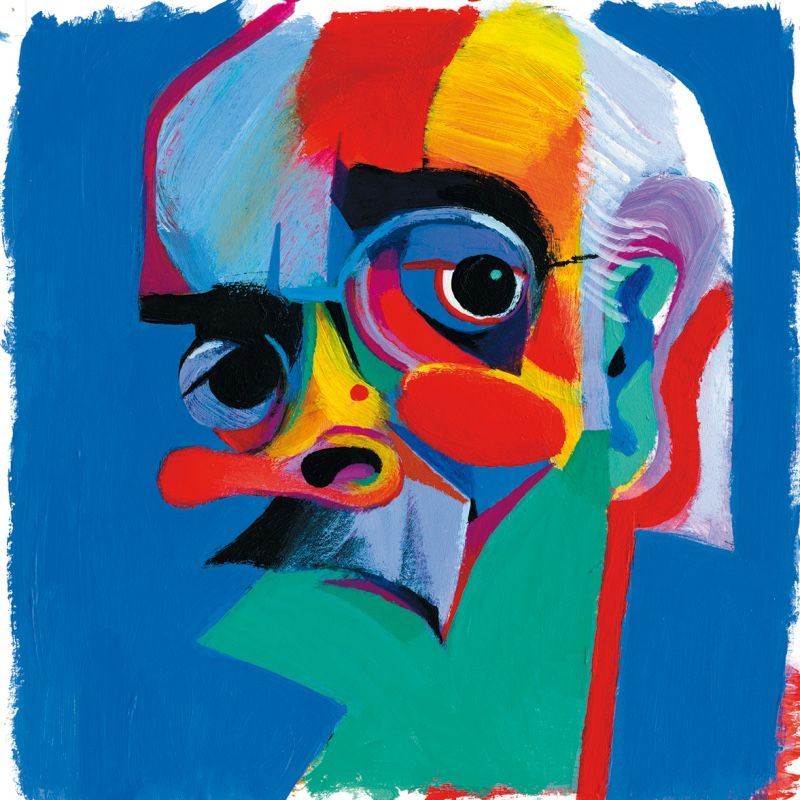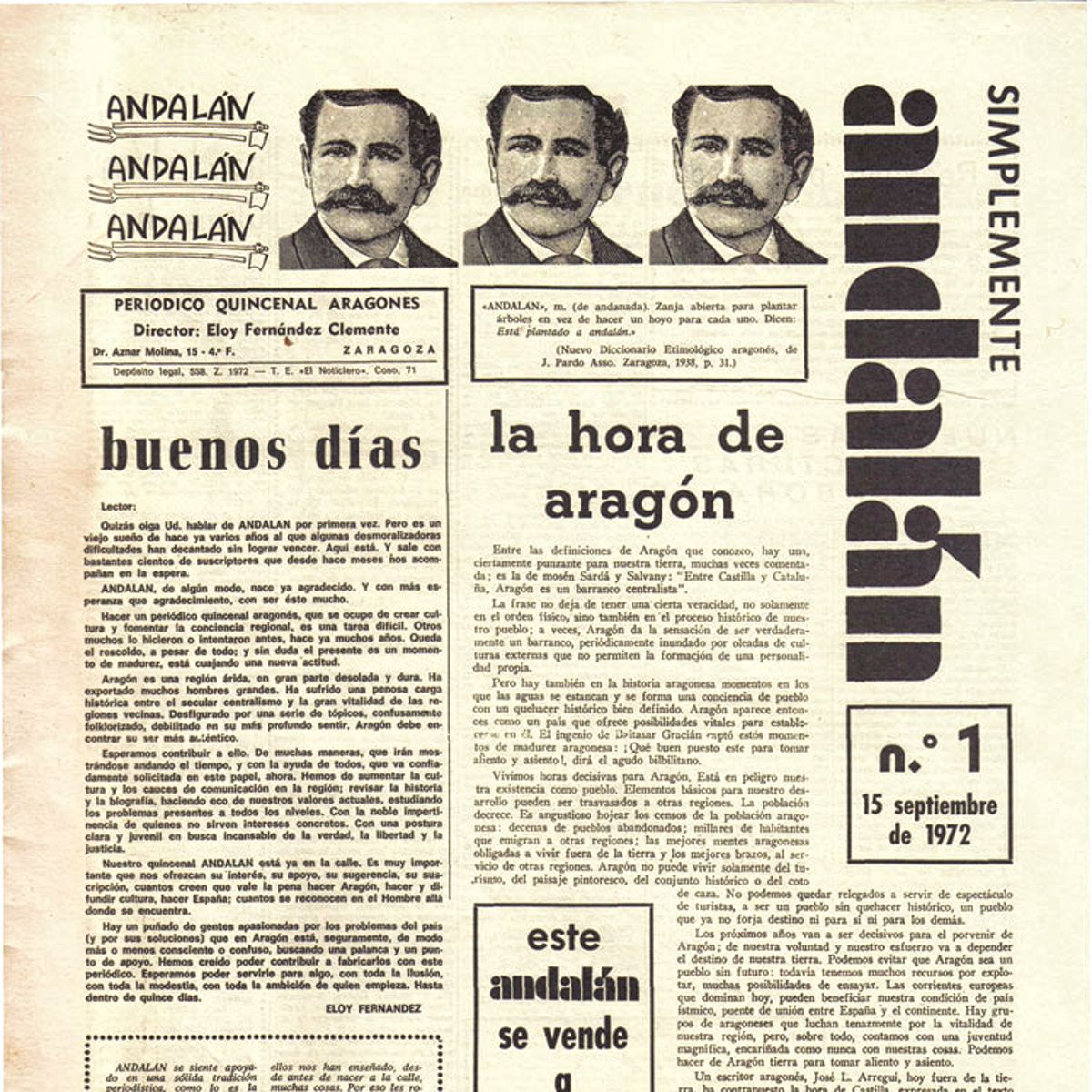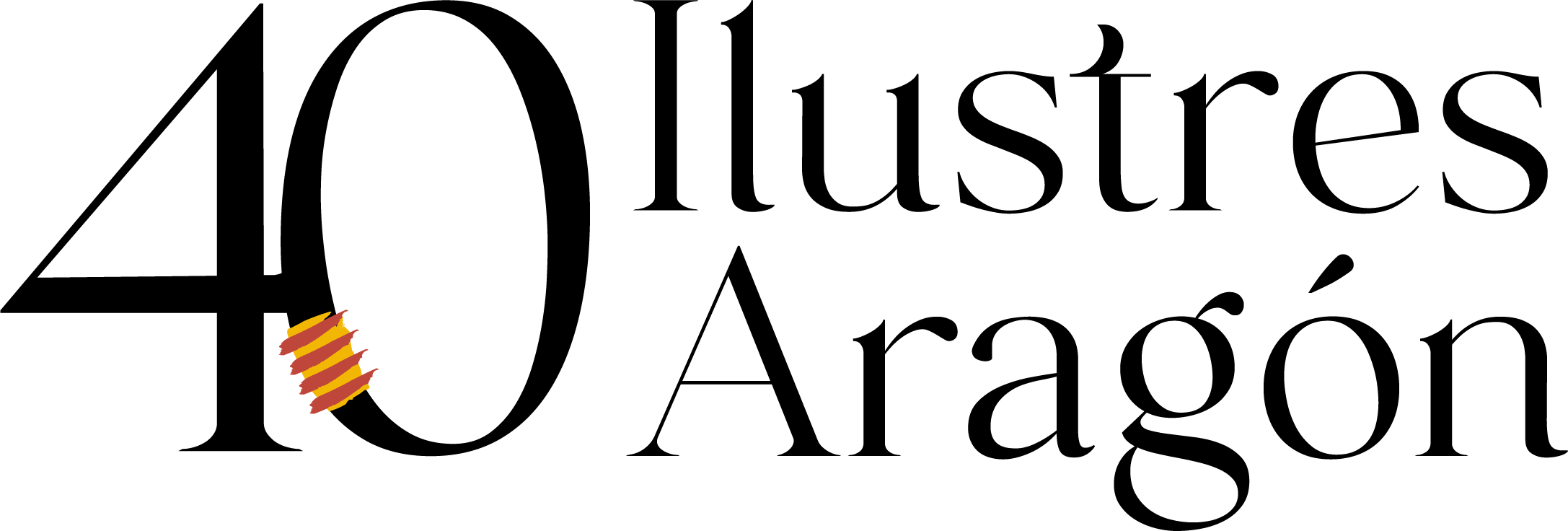José Antonio Labordeta
The most beloved voice
Saragossa, 1935 – 2010
The fourth son of Miguel Labordeta and Sara Subías spent his childhood in a country and a city drowned in the silence and scarcity of the post-war period, but from the very beginning he looked for chinks that would filter the air of freedom. He found them in the friends of his childhood, adolescence and youth (such as Emilio Gastón and Vicente Cazcarra) with whom he would never lose contact. He found them, despite the distance of fourteen years, in the older brother he admired and thanks to whom he also became a poet. He found them in the summers in Canfranc…
His primary studies at the German School and at the Santa Tomás School (owned by the family), the Baccalaureate, two courses in Law before moving on to Philosophy and Letters, a love of theatre… were parallel to an awakening to literature that culminated in the Niké sessions, the magazine Orejudín and the publication of Sucede el pensamiento (Succeeding Thought) in 1959. The following year he graduated and went to France as a lecturer in Spanish at the University of Aix-en-Provence, where he was able to listen to George Brassens and Jacques Brel.

Life
After passing the competitive exams for Secondary Education and recently married to Juana de Grandes, they were both assigned to the secondary school in Teruel (he as a Geography, History and Art teacher, she as a Latin teacher). For six years of great vital intensity, José Antonio carried out a great teaching and cultural activity both at the secondary school and at the Colegio Menor San Pablo, with colleagues such as Eloy Fernández Clemente and José Sanchis Sinisterra and a promising group of students.
At that time he reactivated his poetic and musical vein: he published Las Sonatas in 1967 and a year later he put chords to some of his poems, from which he produced four songs for a record (Andros II) which would be withdrawn by the censors. It would take him some time to record his music again: it would be in 1974 with Cantar i callar (now an LP), after having grown as a poet (in those years he would publish the collections of poems Cantar y callar, Treinta y cinco veces uno and Tribulatorio).
Work
In 1970, the Labordetas returned to Saragossa with their daughters Ana and Ángela (Paula was born shortly afterwards): the classrooms of the Pignatelli secondary school in Alto Carabinas awaited them. With Eloy, his friend and colleague in Teruel, José Antonio founded Andalán, a fortnightly publication which was to become a reference point for the democratic opposition to Francoism, for Aragonism and a cultural tool of the first order. Andalán was launched in L’Aínsa in September 1972. A year later, he took part in the I Encuentro de la Canción Popular Aragonesa. Labordeta begins to be popular, he is called for cultural weeks and recitals in neighbourhoods and towns all over Aragon.

Multifaceted
After Cantar i callar, his records Tiempo de espera and Cantes de la tierra adentro mark the critical moments of the Transition (the death of Franco, the hopes and uncertainties in a horizon of freedoms…). He commits himself to the political project of the Socialist Party of Aragon, in which he coincides with many people from Andalán, with Emilio Gastón, with Santiago Marraco… An article writer in the press, with sections in Andalán full of irony and wit, such as “El dedo en el ojo” or “Historias de Paletonia”, he continues to give free rein to his creativity and his need to tell things: his 1977 live album is followed by new works: Que no amanece por nada, Cantata para un país, Las cuatro estaciones, Qué queda de ti, qué queda de mí… Recitals, tours, poetry books (Método de lectura), short stories, essays, memoirs and travel books (Con la voz a cuestas, Aragón en la mochila). … in the mid-1980s he had to request a leave of absence from his teaching post.
From then until the turn of the century he diversified his activities in song even more. Between 1985 and 2001 he published: Aguantando el temporal, Qué vamos a hacer, Trilce, the compilation Canciones de amor, Paisajes and Con la voz a cuestas, as well as a couple of live albums (Tú y yo y los demás and Recuento). In addition, in those years he published his essays Tierra sin mar and Banderas rotas, the novels El comité and Mitologías de mamá and the poetry collections Jardín de la memoria, Diario de un náufrago and Monegros. By then, his classics “Canto a la Libertad”, “Aragón”, “La Albada”, “Somos”… were already much more than just songs.
But what made him popular in the 1990s was his appearance in the Spanish Television documentary series Un país en la mochila. A scriptwriter and presenter, Labordeta played a traveller through rural Spain, with a touch and a lucid view of that reality that seduced millions of viewers. He had already shown his talent as an actor in small, occasional roles, but it was here that his interest in travel literature and in delving into the popular world would take on a new lease of life.
This coincided with his entry into politics. He accepted the challenge of Chunta Aragonesista to run in elections with no greater ambition than to lend himself to public representation. In 1999 he won a seat in the Cortes de Aragón and the following year, 75,000 votes took him to the Congress of Deputies. His first legislature coincided with the absolute majority of the Partido Popular, and in that context he championed opposition to the National Hydrological Plan, which opened the way for a water transfer from the Ebro, and opposed Spain’s support for the war in Iraq. Between 2004 and 2008, under the Socialist government, he was a prominent member of the commission investigating the 11-M attacks.
And in more: in his denunciation of abuses of power and territorial imbalances, in his defence of dignity and social justice, and so on. Many, Aragonese or not, whether they had voted for him or not, felt represented by this way of doing politics, conceived as a service to the citizen. Of his experience as a parliamentarian, he took stock in Memorias de un beduino, with a sense of humour and tenderness similar to those of Regular gracias a Dios, both books published when his illness was undermining him.
During his years as a member of parliament he had not given up literature (Cuentos de San Cayetano, the novel En el remolino, poems in publications, the odd blog…) or music, sharing gigs and some recordings with his friends Joaquín Carbonell and Eduardo Paz. He had never stopped working, but public life called for a break. Then came the recognitions: the one given to him by Rolde de Estudios Aragoneses and the Sociedad de Autores in November 2008 at the Teatro Principal in Saragossa, the Gold Medal for Merit in Work, the Grand Cross of Alfonso X the Wise, the honorary doctorate from the University of Saragossa…
None of these tributes could compare to the mourning and the popular outcry that José Antonio Labordeta gathered around his memory after his death in September 2010. He was “a common man”… and many other things besides.
Referencias
-
- Javier Aguirre, coord. (2008): José Antonio Labordeta. Creación, compromiso, memoria. Zaragoza, Rolde de Estudios Aragoneses – Fundación Autor.
- Antonio Pérez Lasheras, ed. (2011): Para creernos vivos todavía (José Antonio Labordeta en la memoria). Zaragoza, REA.
- Antonio Pérez Lasheras (2011): La duda del paisaje (Vida y obra de José Antonio Labordeta). Zaragoza, Eclipsados.
- Joaquín Carbonell (2012): Querido Labordeta. Barcelona, Ediciones B.
- Daniel Viñuales, Carlos Azagra, Encarna Revuelta (2018): TeBeO Labordeta. Zaragoza, GP Ediciones-Fundación José Antonio Labordeta.
- Daniel Viñuales, Carlos Azagra, Encarna Revuelta (2020): Señoría Labordeta. Zaragoza, GP Ediciones- Fundación José Antonio Labordeta.
- Wikipedia: https://es.wikipedia.org/wiki/Jos%C3%A9_Antonio_Labordeta
- José Antonio Labordeta Foundation website: http://www.fundacionjoseantoniolabordeta.org/
There is an abundance of studies and publications on the figure and work of José Antonio Labordeta. Here we show only general and more current references.
As for his own work, in addition to the records and books mentioned throughout the biography (to which we could add his essay on Miguel Labordeta, with Javier Delgado in 1987, or the travel book Un país en la mochila, from 1995), we can add different compilations and rescues of songs, poems, stories and other unpublished texts or texts scattered in magazines. During his lifetime, for example, the book of articles Los amigos contados (1994), or Dulce sabor de días agrestes. Antología de poemas y canciones (2003, edited by Javier Aguirre). And then…
-
- VV. AA. (2011): Canto a la Libertad. Un himno para un pueblo. Zaragoza, Comisión Promotora “Canto a la Libertad, himno de Aragón”. In relation to this initiative, you can see the documentary made in the same year by Vicky Calavia: Canto a la Libertad, himno de Aragón.
- José Antonio Labordeta (2011): Historia de Paletonia. Zaragoza, Comisión Promotora “Canto a la Libertad, himno de Aragón”.
- José Antonio Labordeta (2011): Setenta y cinco veces uno. Poesía reunida (1945-2010). Zaragoza, Eclipsados.
- Collections of short stories Mercado Central (2011) y Paisajes queridos (2017).
- The disc En el jardín de la memoria (2016).
We can also mention two audiovisual pieces of great interest: the 2020 documentary film Un país en Labordeta (directed by Charlie Arnaiz and Alberto Ortega), and Labordeta, un hombre sin más (Gaizka Urresti and Paula Labordeta, directors; script by Ángela Labordeta and Miguel Mena), which is scheduled for release in September 2022.
Teaching activities
Labordeta and Aragón
Teacher, poet, storyteller, singer-songwriter, actor, communicator, politician (it would be more appropriate to call him “public man”)… José Antonio Labordeta is a key figure in understanding Aragon in the second half of the 20th century. The years of the dictatorship and the repression, the exciting (and uncertain) times of the transition to democracy and the fight for freedoms, the recovery of identity and self-esteem among the Aragonese… are all traversed by his life’s events.
The whole of Aragon is at the centre of his concerns. The song “Aragón” was one of the first songs that Labordeta recorded and sang in his recitals. These are its first verses:
Polvo, niebla, viento y sol
y donde hay agua, una huerta;
al norte, los Pirineos:
esta tierra es Aragón.
Al norte, los Pirineos
al sur, la sierra callada,
pasa el Ebro por el centro
con su soledad a la espalda.
Dicen que hay tierras al este
donde se trabaja y pagan…
Hacia el oeste el Moncayo
como un dios que ya no ampara.
Do you find parallels with Labordeta’s song “Aragón”? Why does it talk so much about the dry land, why do you think it gives so much importance to water?
Perhaps we can understand the reason for this message if we know a little better the context of the 1970s, in which these songs were conceived (or others, such as “La Albada” by Labordeta, “Los de Huesca y de Teruel” by La Bullonera, or “Cuando vayas a Huesca”, by Joaquín Carbonell, for example).
In Aragon, the opposition to Franco’s regime and the demands for freedom expressed from many areas of society (university, workers’, peasants’ and neighbourhood movements, professional associations…) converged with a regional conscience manifested in episodes such as the opposition to the Ebro water transfer project. The appearance of Andalán, the discovery of one’s own history, the cultural weeks and days completed a mosaic to which different political options would be added. And with all this, Aragonese popular song: a phenomenon that went beyond the strictly musical to identify with the desire for freedom, for autonomy and democratic demands. There was a constant succession of meetings and recitals, individual or collective, completing the programmes of festivals and meetings of associations, as the icing on the cake of cultural weeks, or adding a musical and vindictive note to political events.
Look up information and assign the corresponding year to each of these events. In this way you will be able to order the sequence chronologically.
- Approval of the Statute of Autonomy
- First meeting of the Aragonese Popular Songs
- Decree of Pre-autonomy and autonomist demonstrations
- First autonomous elections
- Death of Franco
- First autonomist meeting in Caspe
- First issue of Andalán
- First democratic general elections
- Opposition to the Ebro water transfer
- First democratic municipal elections
- 1972: ……………………………………………………………………………………………
- 1973: ……………………………………………………………………………………………
- 1974: ……………………………………………………………………………………………
- 1975: ……………………………………………………………………………………………
- 1976: ……………………………………………………………………………………………
- 1977: ……………………………………………………………………………………………
- 1978: ……………………………………………………………………………………………
- 1979: …………………………………………………………………………………………..
- 1982: ……………………………………………………………………………………………
- 1983: ……………………………………………………………………………………………
Solutions: 1972 (7), 1973 (2), 1974 (9), 1975 (5), 1976 (6), 1977 (8), 1978 (3), 1979 (10), 1982 (1), 1983 (4)
In the beginning it was Teruel
We cannot understand the role that Aragon plays in Labordeta’s songs without grasping what Teruel meant to him as a discovery. Antonio Pérez Lasheras tells us:
Teruel meant in José Antonio’s spiritual biography the contact with a social reality unknown to him until then: the countryside, the masoveros, that rural world as mythologised as it was unknown by intellectuals of petty-bourgeois origin. His first songs reveal this discovery: the harshness in which the people of those places live. This moment is also important because it marks the establishment of his poetic voice, the assimilation of a poetic “I” that comes to represent the “voice of the voiceless”, the “we” of those who are unable or incapable of raising their own message.
What are the mases and who are the masoveros? What does he mean by “the voice of the voiceless”? Why do you think he says that there is a shift from an “I” to a “we”?
Labordeta dedicates a song from his album Cantar i callar (1974) to the “masoveros”.
Tierra para labrar
agua para sembrar
eso quieren los hombres
que están arriba en aquel mas.
Eso quieren los hombres
que están arriba en aquel mas.
Pastos para el ganao
hijos para criar
y al llegar el invierno
tener su leña p’a calentar.
Y al llegar el invierno
tener su leña p’a calentar.
Frutos en el frutal
fuerzas para segar
y al entrarles la muerte
tener su tierra p’a descansar.
Y al entrarles la muerte
tener su tierra p’a descansar
The life he describes is very routine, with hard work and little rest, and with a rather sad ending. Labordeta lived in Teruel and knew these realities almost sixty years ago. Do you know people who work in agriculture or livestock farming (maybe in your family, a relative… maybe you live in a city but you have a village to go to on holidays and weekends)? Maybe the life of those who work in the countryside is not so hard now, but maybe they have other problems. Ask about it if you have someone close to you.
Songs of uprooting… and of hope… and of irony.
Many of Labordeta’s songs speak of this rural world, of emigrants, of the abandonment of such hard ways of life, of uprooting…
On his 1977 live album, Labordeta included the song “Regresaré a la casa”.
Regresaré a la casa,
La casa de mi padre,
Abriré la ventana
Y que la limpie el aire.
Que limpie la esperanza,
Que arrastre los recuerdos
Y arranque de los muros
Los retratos ya viejos.
Que azote las arañas,
Las ratas campesinas
Que invaden los rincones,
Donde murió la vida.
Regresaré a la casa…
Renovaré los suelos,
El techo, los tejados
Y el muro que soporta
Los cierzos más airados.
Blanquearé el silencio,
El patio, la cadiera
Y el rincón donde niños
Crecimos hacia fuera.
Regresaré a la casa…
Y cuando respirables
Resulten las alcobas
Traeré a mis compañeros
Para iniciar la obra
De levantar un árbol
Delante de la puerta
Que dé cobijo al aire
Y al hombre le dé sombra.
Regresaré a la casa…
How do you appreciate these lyrics? Are they as sad as those of the masoveros, or do they leave a space for hope and the future?
Labordeta talks about difficult realities, he puts the problems on the table, but he also detects solutions. In the end, after the bad things, better times may come.
The phenomenon of depopulation is very present nowadays in speeches, in politicians’ agendas, in the media, in claims such as those of “empty Spain” and in fair demands for equality in the distribution of resources and services… All this, we know, has been going on for a long time. Labordeta dealt with it in his songs… but he also saw the opportunity to bring out his irony.
The “Meditations of Severinus the Deaf” go that way:
Arremójate la tripa
que ya viene la calor
que luego, en el mes de Agosto,
no suelta el agua ni Dios.
Evaristo el cuchillero
se ha comprado ahora un camión
y pasando el puente en Fraga
desde arriba lo midió.
Los hijos de la María
se han marchado a Nueva York;
uno trabaja de negro
otro de indio en un salón.
Marcelino y la Miguela
se han ido a la emigración;
ahora dicen “guntentajen”
“aufidersen”, chulico.
De cien vecinos que éramos
ya solo quedamos dos;
Don Florencio, que es el amo
y un seguro servidor.
Don Florencio vive en Huesca
aquí solo quedo yo,
con una cabra mochales
una gaita y un tambor.
Un día cojo la cabra
la trompeta y el tambor
y me voy a Zaragoza
y que pregone el patrón.
Do you think that looking at things in a light-hearted and humorous way helps us to face problems better than if we take them too seriously? Have you ever had a personal situation, with your family, with your friends, that made you think about it? Perhaps a conflict or a problem that, by looking for a funny side to it, has lost importance?
Labordeta uses a lot of humour, irony, sarcasm… In 1977 and 1978 he published Historia de Paletonia in the newspaper Andalán in instalments, which is a metaphor for the Aragon of those years: a country that was searching for itself without finding itself, with speculators, profiteers, people whose “trade” was to emigrate, little self-esteem, little appreciation of culture… The author distorted reality by accentuating the grotesque, the shocking, with the intention of criticising things such as, for example, the lack of initiative:
Trade is going badly, because the peoples subjected to the domination of the Paletons hardly practise any other trade than that of survival. And the Paletons like to save money. Their maxim is “He who sells, dies”. And they all die, but they don’t sell. Nor do they buy. And so goes the country.
The compilation volume of these articles in Historia de Paletonia appears among the references.
The poets speak
Labordeta’s sardonic character coexists with a certain stern air. The serious and responsive deputy in the Cortes is combined with the popular and rocking public figure. All this, in the end, forges the reality of an affectionate and tender person, with great sensitivity.
Continuing with the contrast… his most vindictive and social anthems, those songs appreciated as symbols of struggle, such as “El Canto a la Libertad”, accompany other much more poetic lyrics. His poetry is very intimate, very personal and human.
The nostalgia for lost causes is in verses like these from Banderas rotas:
He puesto sobre mi mesa
todas las banderas rotas
las que rompió la vida
la lluvia y la ventolera
de nuestra dura derrota.
In this one he seems to appeal to childhood memories (from Jardín de la memoria, 1985):
Pequeñas palabras en el aire
atemorizan la soledad de los paisajes
y el tenue olor a invierno
que azota las ventanas.
Las pequeñas palabras –vino,
amor, padre, silencio– continúan
rodando por los labios
como días recién inaugurados.
And he appeals to universal values in a nutshell (in Diary de un náufrago, 1988)
Y el mar
como una gota de paz
en la esperanza.
What themes predominate in these poems, do you think it is a grandiloquent poetry or a contained poetry, more attentive to the small things, to detail?
Search on the platform “The books movie” for these recited texts by two poets closely linked to José Antonio Labordeta
An initiatory journey
In the autumn of 1969, a childhood friend, José Antonio García Dils, living in Sweden, asked Labordeta to perform at some concerts for the benefit of the prisoners of Franco’s dictatorship. He was just starting his musical career and was very sad after the death of his brother Miguel. He had dedicated verses like these to him:
Dejó después
su mano entre las manos y se nos marchó
con un suave silencio
que el viento rompió.
Su soledad
abrió por los caminos la necesidad
que levanta a los hombres
a la libertad.
He left with that sorrow, but for him it was an experience that would mark his later career. Mats Lundahl, the young Swedish student who accompanied Labordeta on that journey, recounted that experience much later. All this is in the book Viajes a Ultima Thule. Labordeta en Suecia, published by Rolde de Estudios Aragoneses in 2017.
Research. In 1969, what was the political regime in Sweden, and do you think there was much contrast with Spain at the time? The young singer-songwriter made some statements to the Swedish press that made big headlines mixed with criticisms of Franco. Fortunately for him, nobody in Spain found out about it. Do you think there could have been reprisals when he returned to Spain?
Friends for eternity
For José Antonio Labordeta, friendship was something fundamental. Friends from his childhood, adolescence and youth, plus others whom he met later and with whom he connected perfectly. Here are five of them (all now deceased) whose names you will be able, after researching their lives, to relate to the appropriate definition.
- Emilio Gastón a) Lawyer and poet, member of the PSA, he was the first Justice of Aragon in contemporary times.
- Vicente Cazcarra b) Fellow at Andalán, world specialist in Mudejar art
- Gonzalo Borrás c) He was a student of Labordeta in Teruel, journalist, writer and singer-songwriter.
- Félix Romeo d) Writer and cultural activist, died at the age of 43.
- Joaquín Carbonell e) He suffered imprisonment during the dictatorship, led the Communist Party of Spain in Aragon.
Solutions: 1-a, 2-e, 3-b, 4-d, 5-c
Dedicated to so many comrades in fatigues and battles, in 1984 he composed a beautiful generational song: “Somos”.
Somos
Como esos viejos árboles
Batidos por el viento
Que azota desde el mar.
Hemos
Perdido compañeros,
Paisajes y esperanzas
En nuestro caminar.
Vamos,
Sintiendo en las palabras
Las huellas de los labios
Para poder besar.
Tiempos
Futuros y anhelados
De manos contra manos
Izando la igualdad.
Somos
Como la humilde adoba
Que cubre contra el viento
La sombra del hogar.
Hemos
Perdido en nuestra historia
Canciones y caminos
En duro batallar.
Vamos
A echar nuevas raíces
Por campos y veredas
Para poder andar.
Tiempos
Que traigan en su entraña
Esa gran utopía
Que es la fraternidad.
Somos
Igual que nuestra tierra
Suaves como la arcilla
Duros del roquedal.
Hemos
Atravesado el tiempo
Dejando en los secanos
Nuestra lucha total.
Vamos
A hacer con el futuro
Un canto a la esperanza
Y poder encontrar.
Viejos
Cubiertos con las manos
Los rostros y los labios
Que sueñan libertad.
Somos
Como esos viejos árboles.
From the local…
Labordeta is deeply Aragonese and deeply Saragossan. He dedicated to his native city love and hate alike in his “Zarajota blues” (in “Aguantando el temporal”).
Esta vetusta ciudad
vieja como ninguna
que te observa caminar
como si vas por la luna
La amo
la odio
le tengo un cariño ancestral
Esta ciudad, Zaragoza
siempre se quiere dejar
junto a la boira y al cierzo
y a parte del personal.
La amo…
Camino por sus callejas
con la nostalgia del mar
para que ahogue la envidia
y nos pueda liberar.
La amo…
Quieta en la orilla del río
espantada al tiempo
sujeta al desvarío
loca de calles locas
solitaria
con plazas deslumbradas
y paisajes al borde del silencio.
La amo…
Madrastra
madre inútil
invierno de un estío brutal sin primavera
y ese otoño dulcísimo
que afila las paredes de tus viejas murallas
cayéndose por todas tus ventanas.
La amo…
Vieja tumba crecida a mis espaldas
¿a qué hora abandonas el mundo
para huir con nosotros hacia la hermosa mar
tan dulce y tan lejana?
La amo…
Esta madrastra terrible
que crece entre los secanos
arrebatándole al Ebro
la fuerza de entre sus manos
La amo…
Espero que un día baje
un fuego de libertad
que le rebaje los humos
de ser una gran ciudad.
La amo…
Tres cosas encontrarás
si en Zaragoza te metes
la envidieta, la locura
y un trozo de libertad.
La amo…
Mark on a map of Saragossa, these emblematic places in José Antonio Labordeta’s Saragossa:
-
- San Cayetano square, or Justicia’s square, and the area around the Central Market, the place of his childhood.
- Teatro Principal, the scene of the founding milestone of Aragonese popular song.
- Café de Levante. A place of conversation among many cortados
- José Antonio Labordeta Foundation, the custodian and responsible for spreading his legacy.
- Casa Emilio Restaurant. A place of meeting, celebration, commitment and friendship
- Parque Grande José Antonio Labordeta, named after his death.
… to the universal…
Labordeta composed the “Canto a la Libertad” in 1975, and from the first recitals it was chanted as a true hymn.
Habrá un día
En que todos
Al levantar la vista,
Veremos una tierra
Que ponga libertad.
Hermano, aquí mi mano,
Será tuya mi frente,
Y tu gesto de siempre
Caerá sin levantar
Huracanes de miedo
Ante la libertad.
Haremos el camino
En un mismo trazado,
Uniendo nuestros hombros
Para así levantar
A aquellos que cayeron
Gritando libertad.
Habrá un día
En que todos
Al levantar la vista,
Veremos una tierra
Que ponga libertad.
Sonarán las campanas
Desde los campanarios,
Y los campos desiertos
Volverán a granar
Unas espigas altas
Dispuestas para el pan.
Para un pan que en los siglos
Nunca fue repartido
Entre todos aquellos
Que hicieron lo posible
Por empujar la historia
Hacia la libertad.
Habrá un día
En que todos
Al levantar la vista, veremos una tierra
Que ponga libertad.
También será posible
Que esa hermosa mañana
Ni tú, ni yo, ni el otro
La lleguemos a ver;
Pero habrá que forzarla
Para que pueda ser.
Que sea como un viento
Que arranque los matojos
Surgiendo la verdad,
Y limpie los caminos
De siglos de destrozos
Contra la libertad.
Habrá un día
En que todos
Al levantar la vista,
Veremos una tierra
Que ponga libertad.
Habrá un día
En que todos
Al levantar la vista,
Veremos una tierra
Que ponga libertad.
After the death of José Antonio Labordeta, a number of cultural organisations launched a campaign to make the “Canto a la Libertad” the anthem of Aragon. The legislative initiative did not come to fruition due to parliamentary arithmetic, but it left different cultural initiatives (books, festivals, an exhibition, an audiovisual, etc.) and the certainty that a message based on universal values, lived by the people, can also be a powerful element of identity.
… passing through Aragon
Listen to these musical themes proposed by different Aragonese artists. They have Aragon as the main character in a comprehensive way (in their own way they are also hymns).
Do you detect any Labordeta influences in them or, at least, do they remind you of any of the songs we have talked about?
Latest recommendations


DIRECCIÓN GENERAL DE POLÍTICA LINGÜÍSTICA
Departamento de Educación, Cultura y Deporte
Parque Empresarial Dinamiza (Recinto Expo)
Avenida de Ranillas, 5D - 2ª planta
50018 Zaragoza
Tfno: 976 71 54 65
Colabora:


